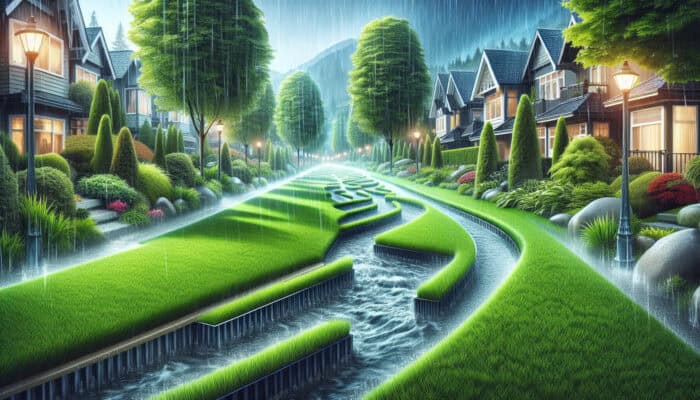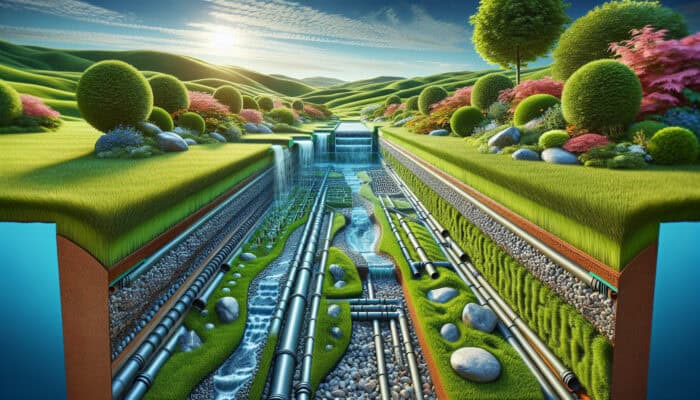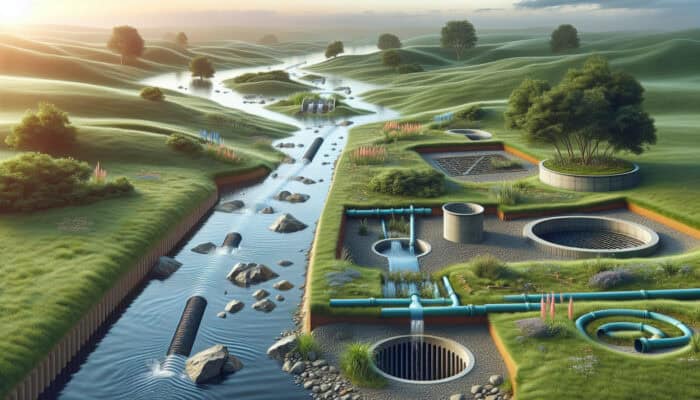Mastering Lawn Drainage Techniques for a Lush and Thriving Landscape
Understanding Lawn Drainage: The Importance of Prioritizing It for Your Landscape

When considering Lawn Drainage Services in Kitsilano, Vancouver, the management of water flow is vital for cultivating a healthy and vibrant lawn. Given that the region experiences heavy rainfall, it is essential to understand how to effectively prevent water pooling and potential damage to your lawn. A well-drained lawn promotes lush grass growth, reduces soil erosion, and protects your landscaping investments. Some of the frequent issues arising from insufficient drainage include:
- Water pooling in low-lying areas
- Soggy patches that remain consistently wet
- Excessive moss growth resulting from trapped moisture
- Root rot that negatively impacts plant health
- Soil erosion caused by heavy rainfall events
- Waterlogged sidewalks and driveways that become hazardous
Addressing these drainage challenges is essential not only for enhancing the visual appeal of your yard but also for ensuring the health and vitality of your plants and the quality of your soil.
The Critical Role of Effective Lawn Drainage in Maintaining Your Lawn’s Health
In Kitsilano, the significance of efficient drainage systems cannot be understated, particularly due to the region's unique climate marked by wet winters and well-drained summers. Without reliable drainage solutions, homeowners may confront challenges such as soil erosion, which can jeopardize both property integrity and the aesthetic quality of the landscape. The advantages of maintaining appropriate drainage extend well beyond mere aesthetics:
- Prevention of soil erosion that can destabilize your yard
- Reduction of waterlogged areas that inhibit lawn usage
- Improvement in overall plant health and growth
- Minimization of flooding risks that can damage property
- Enhancement of overall property value through well-maintained landscapes
- Increased usability of lawn and garden spaces for recreational activities
Implementing effective drainage practices not only safeguards your investments but also contributes to a sustainable and visually appealing environment for you and your family.
Identifying the Indicators for Lawn Drainage Services: How to Spot the Need
Recognizing early warning signs of drainage issues can save homeowners both time and money in the long run. Common indicators that suggest you may need professional drainage services are:
- Visible water pooling that persists after rainfall
- Soggy or mushy patches forming on the lawn
- Excessive moss and algae growth indicating moisture retention
- Stagnant water accumulating near your home's foundation
- Plant die-off or signs of root rot affecting growth
- Visible erosion on slopes or hills that threatens soil stability
Being attentive to these signs is crucial, as they often signal underlying drainage issues that require professional assessment and remediation to restore your lawn's health.
Understanding How Lawn Drainage Systems Work Efficiently

Essential Components of an Efficient Lawn Drainage System
A well-designed drainage system comprises several critical components working together to manage water effectively. Familiarizing yourself with these elements can empower you to identify the best drainage solutions for your yard. Typically, a drainage system includes:
- Pipes: Vital for channeling water away from saturated areas and preventing pooling.
- Catch basins: Specifically designed to collect surface water and sediment.
- Outlets: Facilitate the discharge of water into designated areas, such as storm drains or natural water bodies.
- Grading: Refers to the slope of the land that aids in directing water flow away from structures.
Each of these components plays a crucial role in ensuring that excess water is diverted away from your lawn and home, thereby preventing damage and preserving the integrity of your landscaping.
How to Evaluate Your Lawn’s Drainage Needs Effectively
Assessing your lawn’s drainage requirements is essential for implementing an effective solution. Begin with a straightforward evaluation that considers various factors, including soil type, slope, and existing water pathways. This can typically be achieved through:
- Observing how quickly water drains after a rainfall event.
- Identifying areas where water tends to accumulate consistently.
- Examining soil composition, noting that clay soils drain poorly compared to sandy soils.
- Looking for signs of erosion or sediment build-up that may indicate drainage issues.
Conducting this assessment enables you to pinpoint areas needing immediate attention and determine the most effective drainage system tailored to your lawn’s specific requirements.
Exploring Different Types of Lawn Drainage Systems Available

Lawn drainage systems are not universally applicable; various types are designed for specific functions, each offering its own set of advantages and drawbacks. The most commonly utilized systems include:
- French drains: Excellent for redirecting groundwater away from problem areas effectively.
- Surface drains: Efficient at capturing excess surface water to prevent pooling.
- Dry wells: Allow water to gradually dissipate into the ground, ideal for regions with poor drainage capabilities.
- Swales: Shallow channels designed to direct and control water flow away from your property.
Understanding the benefits and limitations of each drainage system type will help you choose the most suitable option tailored to your lawn’s unique needs, maximizing efficiency and effectiveness in managing water.
Steps to Successfully Implement a Lawn Drainage System
The installation of a lawn drainage system demands careful planning and execution. Begin by identifying the areas that require drainage and then follow these steps:
- Dig trenches according to your planned layout for the drainage system.
- Install pipes, ensuring they are sloped appropriately for optimal water flow.
- Position catch basins in areas where water tends to accumulate.
- Cover the trench with soil and sod to ensure a seamless transition to the surrounding landscape.
While some homeowners may consider this a DIY project, complex systems often necessitate professional expertise to ensure proper installation and functionality. Taking the time to execute the project correctly from the outset can help you avoid costly repairs and complications in the future.
Expert Insights on Lawn Drainage Solutions in Kitsilano, Vancouver
What Expertise Do Local Professionals Offer for Managing Lawn Drainage?
Local experts emphasize the importance of tailored solutions that address the unique conditions prevalent in Kitsilano. Considering the area's significant rainfall and clay-heavy soils, professionals advocate for regular maintenance to ensure optimal performance. Many experts observe that homeowners frequently overlook critical aspects such as proper grading and the installation of catch basins in high-risk areas. Real-world examples shared by local drainage specialists demonstrate how customized solutions can dramatically enhance lawn health and longevity. They highlight the necessity of comprehensive assessments to identify potential problem areas early on.
Choosing the Right Drainage Service Provider: Key Considerations
Selecting an appropriate drainage service provider is crucial for the successful installation and maintenance of your drainage system. Start by researching local companies with extensive experience in lawn drainage solutions specifically tailored to Kitsilano. Seek customer feedback and request references from previous clients to gauge their reliability. A reputable provider will have a strong track record of delivering customized services suited to the local environment. Practical steps to consider include:
- Requesting multiple quotes to compare service offerings and pricing.
- Inquiring about their experience with similar drainage projects.
- Evaluating their understanding of local soil and drainage challenges.
- Confirming relevant certifications and insurance coverage for their work.
Engaging in this thorough vetting process ensures you select a provider capable of delivering high-quality drainage solutions tailored to your needs.
Recent Innovations Transforming Lawn Drainage Technology
The lawn drainage sector is evolving with the introduction of innovative technologies and materials. Among the latest advancements are smart drainage systems that utilize sensors to monitor moisture levels and automated control systems to manage water flow efficiently. These innovations significantly enhance sustainability and efficiency by providing real-time data, enabling homeowners to make informed decisions regarding their lawn’s requirements. Additionally, eco-friendly materials such as permeable pavers are gaining popularity, offering both aesthetic and functional benefits. Expert evaluations suggest that these advancements can dramatically improve drainage performance, particularly in challenging climates like that of Kitsilano.
The Multifaceted Benefits of Engaging Professional Lawn Drainage Services
Key Advantages of Hiring Professional Services for Lawn Drainage
When it comes to lawn drainage, enlisting professionals provides numerous benefits compared to DIY solutions. Experts possess extensive knowledge, specialized equipment, and the efficiency necessary to tackle your project effectively. They can accurately diagnose complex drainage issues that might be overlooked by an untrained eye. Furthermore, professionals are familiar with local regulations and best practices, ensuring compliance and optimal results. Their specific skills include:
- Advanced problem-solving capabilities to address unique drainage challenges
- Access to specialized tools and technology for efficient installations
- Experience with various drainage systems tailored to specific needs
- Ability to create customized drainage plans that fit your landscape
Ultimately, their expertise results in a reliable and effective drainage solution tailored to your specific needs and circumstances, ensuring your lawn remains healthy and vibrant.
How Professional Services Can Help You Save Costs in the Long Run
Although the initial costs of hiring professionals may seem significant, the potential savings over time can be considerable. Professional services can prevent costly repairs and extensive property damage by addressing issues early on. Moreover, many companies offer warranties and post-installation maintenance plans, ensuring long-term protection for your investment. Professionals leverage their experience to identify and rectify problems efficiently while recommending proactive measures to avert future issues, ultimately saving you considerable resources in the long run.
What to Expect from a Professional Drainage Service Engagement
Engaging a professional drainage service typically involves several stages. Initially, you can expect a comprehensive assessment of your lawn to identify problematic areas. Following this, the team will develop a customized drainage plan tailored to your specific needs and landscape. During the installation phase, expect efficient execution with minimal disruption to your property. Furthermore, many companies also offer follow-up maintenance services, which may include routine inspections and adjustments to ensure sustained effectiveness. This comprehensive approach guarantees that your drainage system operates optimally for years to come.
Common Lawn Drainage Challenges Faced in Kitsilano, Vancouver
Factors Contributing to Poor Drainage in Kitsilano: What to Know
Several factors contribute to inadequate drainage in Kitsilano. The region’s heavy rainfall combined with clay soils are significant contributors, as clay inhibits water flow and leads to pooling. Other causes include improper grading, which can redirect water towards your home instead of away from it, and debris accumulation within drainage systems. Recognizing these root causes is essential for effective remediation. The most common contributors to poor drainage in Kitsilano include:
- Heavy rainfall patterns causing excess water accumulation in lawns
- Soil composition, particularly high clay content that retains moisture
- Improper landscaping and grading practices that exacerbate drainage issues
- Blockages in existing drainage systems that prevent effective water flow
Identifying these issues early allows homeowners to take proactive measures to improve their lawn’s drainage capabilities and ensure a healthy landscape.
Effective Strategies to Prevent Lawn Drainage Problems
Preventing drainage issues necessitates a proactive approach that includes regular maintenance and effective landscaping practices. Homeowners should perform periodic inspections of their drainage systems to ensure that no debris obstructs water flow. Regular soil aeration can improve drainage by relieving compacted areas. Additionally, implementing proper landscaping techniques, such as incorporating native plants with deep root systems, can significantly enhance soil structure. Consider the following prevention strategies:
- Regularly check and clean gutters and downspouts to prevent blockages.
- Aerate the lawn annually to improve soil drainage and health.
- Install French drains in areas prone to water pooling to redirect flow.
- Conduct routine inspections and maintenance of drainage systems to ensure optimal performance.
By adhering to these practices, homeowners can substantially reduce the likelihood of facing drainage problems and enhance the overall health of their lawns.
Consequences of Ignoring Lawn Drainage Issues: What You Need to Know
Neglecting drainage problems can lead to severe consequences that adversely affect not only your lawn but also the structural integrity of your property. Over time, water accumulation can lead to soil erosion, compromising your home’s foundation and overall safety. Beyond physical damage, poor drainage can pose health risks associated with stagnant water, such as attracting pests and promoting mold growth. Long-term consequences may include:
- Severe lawn damage and loss of biodiversity due to poor conditions
- Foundation issues that lead to costly repairs and safety hazards
- Increased risks of pest infestations that can affect home comfort
- Water damage to surrounding structures and landscaping
Addressing drainage problems promptly is vital for ensuring your lawn's overall health and maintaining the safety and stability of your property.
How to Diagnose Lawn Drainage Problems Effectively in Kitsilano
Diagnosing lawn drainage issues entails careful observation of your property for signs of water-related problems. Homeowners should remain vigilant for visible pooling, soggy soil, or significant erosion. A simple test involves digging a small hole to assess how quickly water drains; if it remains stagnant for an extended period, this indicates poor drainage. Key indicators of drainage issues include:
- Pooling water after rainfall that does not dissipate
- Soggy soil that fails to dry out in a reasonable time
- Visible erosion on slopes that threatens soil stability
- Unusual plant growth, such as moss or algae, indicating excess moisture
Recognizing these signs early allows for prompt intervention, preserving the health and aesthetics of your lawn while ensuring a vibrant landscape.
Professional Solutions for Lawn Drainage in Kitsilano: What to Consider
For ongoing drainage challenges, professional solutions provide effective remediation strategies tailored to your landscape. Options such as installing French drains, which redirect water away from problem areas, are commonly utilized. Re-grading the landscape can further assist by altering the slope to promote proper water flow away from structures. Additionally, soil amendments can enhance drainage capabilities, particularly in heavily compacted clay regions. Consider the following professional interventions:
- Installation of French drains to manage groundwater effectively and prevent pooling.
- Re-grading to improve land slope and facilitate drainage flow away from properties.
- Soil amendments to enhance drainage in heavy clay environments.
- Regular maintenance of existing drainage systems to ensure optimal performance.
These interventions not only address current drainage issues but also contribute to the long-term health and stability of your lawn, enhancing its vitality and usability.
Understanding the Financial Aspects of Lawn Drainage Services
Average Costs Associated with Lawn Drainage Services: What to Expect
The cost of lawn drainage services can vary significantly based on several factors, including the size of your lawn, the complexity of the drainage system, and the materials used. Homeowners can generally expect to invest between $1,000 and $5,000 for installation, depending on the project's complexity and scope. Key factors influencing costs include:
- Size and layout of the property that affects drainage design
- Type of drainage system implemented and its specific requirements
- Soil condition and existing landscaping that may impact the installation
- Labor costs in your region that can vary widely
Understanding these factors can assist you in effectively budgeting for your lawn drainage needs, ensuring you secure the necessary services without undue financial strain.
Hidden Costs to Be Aware of When Planning Lawn Drainage Services
When budgeting for lawn drainage services, it is essential to remain aware of potential hidden costs that may arise. These costs could stem from unforeseen circumstances, such as the need for repairs to existing structures or the procurement of additional materials that were not initially considered. Typical hidden costs may include:
- Repairs to landscaping or hardscaping impacted by the installation process.
- Additional materials required for unforeseen complexities during installation.
- Permit fees that may be necessary for compliance with local regulations.
- Upgrades to existing drainage systems that may need to be addressed.
Being proactive in discussing these possibilities with your chosen contractor can help you avoid surprises and ensure a smoother project experience, leading to successful outcomes.
Maximizing the Value of Your Lawn Drainage Investment: Strategic Approaches
To maximize the value of your lawn drainage investment, careful planning and consideration are essential. Start by obtaining multiple quotes from various service providers and comparing their offerings. Look for companies that provide detailed assessments and transparent pricing without hidden fees. Additionally, consider the long-term benefits associated with the drainage solutions they offer; investing in quality services often results in fewer maintenance and repair needs over time. Strategies to ensure cost-effectiveness include:
- Requesting comprehensive quotes that outline all costs involved in the project.
- Prioritizing quality over price to ensure effective solutions.
- Seeking recommendations from neighbors and consulting local reviews for reliability.
- Evaluating warranty options and ongoing maintenance agreements that ensure sustained effectiveness.
By following these strategies, you can make informed decisions that ensure value and satisfaction in your lawn drainage investment.
Evaluating the Cost-Effectiveness of DIY Lawn Drainage Projects
While pursuing DIY lawn drainage projects may initially seem like a cost-saving strategy, it is crucial to assess your skills and the complexities involved in the project. Many homeowners lack the specialized knowledge necessary to diagnose and implement effective drainage solutions. If you do not have sufficient experience, opting for professional services may prove to be more economical in the long run. Before attempting a DIY project, consider:
- Your familiarity with drainage systems and their installation techniques.
- The time you can realistically dedicate to the project to ensure quality.
- Your ability to obtain the necessary tools and materials for the installation.
- The potential risks associated with inadequate or improper installation that could lead to costly repairs.
Making an informed decision about whether to pursue DIY or professional services is essential for the long-term success of your drainage solution, ensuring it meets your lawn's needs effectively.
Justifying the Costs of Professional Lawn Drainage Services
Professional lawn drainage services justify their costs through a combination of expertise, warranty offerings, and superior results. They bring years of experience and specialized knowledge to your project, ensuring effective solutions tailored to your unique needs and landscape challenges. Additionally, professional services often include warranties that protect your investment and provide peace of mind regarding their work. The benefits offered by these services encompass:
- Thorough assessments that identify potential issues before they escalate.
- Customized drainage solutions based on local conditions and needs.
- Access to advanced tools and technologies that ensure efficient installations.
- Long-term performance and health of your lawn through regular maintenance.
Understanding the value of these professional services can help you appreciate the associated costs, ensuring your investment is well-placed and leads to a thriving lawn.
Essential Maintenance Tips for Lawn Drainage Systems
Frequency of Maintenance for Your Drainage System: Best Practices
Regular maintenance of your lawn drainage system is vital to ensuring its longevity and effectiveness. Homeowners should ideally conduct annual maintenance checks, although seasonal inspections can also be beneficial, especially before and after periods of heavy rainfall. A proactive maintenance schedule helps identify potential issues before they escalate into costly repairs. Recommended maintenance practices include:
- Clearing debris from catch basins and drains to ensure unobstructed water flow.
- Inspecting pipes for blockages or signs of damage that could impede drainage.
- Monitoring water flow and overall drainage efficiency to catch issues early.
- Checking for signs of erosion around drainage systems that may necessitate corrective actions.
By adhering to a regular maintenance schedule, homeowners can extend the life of their drainage systems while ensuring they function optimally, safeguarding their landscape's health.
DIY Maintenance Tasks Homeowners Can Perform to Keep Systems Efficient
Homeowners can perform several DIY maintenance tasks to keep their lawn drainage systems in excellent condition. These simple yet effective practices can help prevent serious issues and ensure that systems operate smoothly. Key maintenance tasks include:
- Regularly clearing leaves and debris from gutters and downspouts to prevent clogs.
- Cleaning catch basins to facilitate unhindered water flow and prevent backups.
- Checking drainage pipes for clogs and addressing them promptly to maintain efficiency.
- Ensuring that landscaping does not obstruct drainage systems, allowing for proper water flow.
These tasks can be accomplished without professional assistance, enabling homeowners to maintain their systems effectively while promoting a healthy lawn and landscape.
Recognizing When to Seek Professional Maintenance Assistance
While homeowners can handle many maintenance tasks, certain situations necessitate professional help. If you notice significant issues or system failures, it is crucial to consult a drainage expert. Signs that indicate the need for professional maintenance include:
- Frequent water pooling despite ongoing maintenance efforts indicating underlying issues.
- Visible signs of erosion or damage around drainage areas that require expert intervention.
- Persistent odors suggesting potential blockages that could lead to more severe problems.
- Unclear or inconsistent water flow from drainage outlets that may signal system failure.
Seeking professional assistance in these scenarios ensures that complex issues are addressed appropriately, safeguarding your lawn’s health and preventing further damage or degradation.
Success Stories: Insights from Lawn Drainage Projects in Kitsilano, Vancouver
Lessons Learned from Successful Lawn Drainage Projects: Best Practices
Successful lawn drainage projects in Kitsilano provide valuable insights into best practices and tailored solutions that can be applied to other landscapes. Many of these initiatives emphasize the necessity of implementing customized approaches that cater to local conditions and the importance of ongoing maintenance to ensure durability. Key lessons drawn from these projects include:
- The importance of conducting thorough initial assessments to identify specific drainage needs.
- Customized solutions enhance effectiveness in unique landscapes and soil types.
- Regular maintenance extends the lifespan of drainage systems and prevents problems.
- Collaboration with local experts yields optimal results and ensures compliance with regulations.
These insights can assist homeowners in planning their drainage solutions effectively, guaranteeing optimal performance and longevity for their landscapes.
Overcoming Common Challenges in Lawn Drainage Projects: Strategies and Solutions
Many successful drainage projects faced typical challenges, such as compacted clay soils, budget constraints, and limited installation space. Innovative solutions, including the use of vertical drainage systems and optimizing land grading, allowed these projects to navigate obstacles effectively. Expert guidance proved vital in addressing these challenges, showcasing the value of professional insight in complex scenarios. Specific challenges addressed included:
- Conducting soil testing to tailor drainage systems to unique conditions.
- Creatively utilizing available space to install effective drainage systems efficiently.
- Careful budget management to maximize results while staying within financial constraints.
- Incorporating local aesthetics into drainage designs to enhance property value and appeal.
These strategies exemplify the adaptability and resourcefulness necessary for successful drainage solutions within challenging environments.
Positive Outcomes Achieved from Successful Lawn Drainage Projects
The results of successful lawn drainage projects in Kitsilano were overwhelmingly positive, leading to improved lawn health, diminished water damage, and increased property value. Homeowners reported heightened satisfaction levels following the resolution of their drainage issues, as well as enhanced usability of their outdoor spaces. Measurable benefits included:
- A significant reduction in water pooling and saturated areas, improving lawn usability.
- Improved plant growth and overall lawn vitality, contributing to a healthier landscape.
- Increased property value due to functional landscaping that appeals to buyers.
- Enhanced curb appeal and outdoor enjoyment for the homeowners and their families.
These results underscore the significant impact that effective drainage solutions can have on both the aesthetics and functionality of residential properties.
Techniques Employed in Successful Lawn Drainage Projects: A Closer Look
Various techniques were implemented in successful lawn drainage projects, adapting to the specific challenges presented by each location. Methods such as French drains, dry wells, and re-grading were commonly employed, each customized to address unique water flow issues. Specific techniques utilized included:
- Installation of French drains to effectively redirect groundwater away from problem areas.
- Re-grading to modify land slopes for improved drainage and water flow.
- Incorporation of permeable materials for driveways and pathways to enhance drainage capabilities.
- Utilizing swales to efficiently direct surface water flow away from properties.
These techniques not only resolved drainage problems but also contributed to a more sustainable and visually appealing environment that enhances homeowners' outdoor experiences.
The Role of Community Engagement in Shaping Successful Projects
Community feedback played a crucial role in shaping drainage projects in Kitsilano, ensuring that solutions were both effective and aligned with residents’ needs. Local input helped to identify common problems and guided project designs to address these concerns efficiently. Integrating community feedback included:
- Conducting surveys to gather resident insights and preferences regarding drainage needs.
- Hosting community meetings to discuss potential solutions and gather input.
- Incorporating design elements that reflect local aesthetics and community character.
- Creating educational materials to inform residents about drainage maintenance best practices.
This collaborative approach not only enhanced project outcomes but also fostered a sense of community involvement and ownership over local drainage initiatives, leading to greater satisfaction and success.
Frequently Asked Questions About Lawn Drainage: Your Guide
What is lawn drainage and how does it work?
Lawn drainage refers to the management of water flow in a landscape, aimed at preventing water pooling and maintaining a healthy lawn. This involves implementing techniques such as drainage systems to control excess moisture effectively and enhance lawn vitality.
How can I determine if my lawn needs drainage services?
Indicators that your lawn may require drainage services include water pooling after rainfall, soggy soil, signs of plant die-off, or visible erosion. Early detection is crucial in preventing more severe drainage issues.
What types of drainage systems are available for residential properties?
Common types of drainage systems include French drains, surface drains, dry wells, and swales, each designed to effectively address different drainage needs and soil conditions specific to your property.
Is it feasible to install a drainage system myself?
While DIY installation is feasible, it necessitates careful planning and knowledge of drainage principles. Complex systems often benefit from professional expertise to ensure proper installation and functionality, ultimately leading to better outcomes.
What are the typical costs associated with drainage services?
Costs can vary based on factors such as lawn size, system complexity, and materials used, with typical installation prices ranging from $1,000 to $5,000, depending on the specifics of your project.
How often should I maintain my drainage system for optimal performance?
Regular maintenance should be performed at least once a year, with seasonal checks recommended, especially before and after heavy rainfall to ensure all systems are functioning effectively.
What proactive measures can I take to prevent drainage problems?
You can prevent drainage problems through regular maintenance, proper landscaping, and ensuring that your drainage systems are free from debris and blockages that could hinder water flow.
What advantages come with hiring a professional for drainage services?
Professionals offer expertise, access to specialized tools, and the ability to diagnose complex problems, ensuring effective and efficient solutions tailored to your drainage needs and landscape conditions.
What are the potential consequences of ignoring drainage issues in my lawn?
Neglecting drainage problems can lead to lawn damage, foundation issues, and expensive repairs, as well as health risks associated with stagnant water, such as attracting pests and promoting mold growth.
How does community feedback enhance drainage project effectiveness?
Community feedback helps tailor drainage solutions to local conditions and resident preferences, leading to more effective outcomes and ensuring that projects address the unique needs of the community.
Connect with Us on Facebook for More Insights and Tips!
Presented By: Lawn Drainage Solutions in Kitsilano Vancouver
The Article: Lawn Drainage Services in Kitsilano Vancouver: Solutions for Your Yard First Published On: https://pacificbluemechanical.ca/
The Article Lawn Drainage Solutions for Your Kitsilano Vancouver Yard Was Found On https://limitsofstrategy.com

